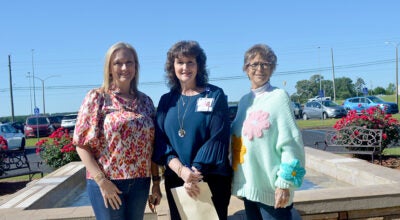It’s official: Stay-at-home order issued for state
Published 6:35 pm Friday, April 3, 2020
|
Getting your Trinity Audio player ready...
|
Alabama officials ordered residents to stay home except for essential trips, work and a few other things starting Saturday, with Gov. Kay Ivey saying Friday that too many people had ignored voluntary limits.
“I’m not surprised by this,” said Herbert Reeves, EMA director for Pike County. “I don’t really think the governor and the (state) health officer had much of a choice.
“They have to do all they can to protect people not just in Pike County, but throughout the state.”
The order, released during an afternoon news conference at the Capitol, is in effect until April 30. It allows people to leave home to get medicine, health care, food and other essentials. It also allows church services, weddings and funerals as long as long fewer than 10 people are present and they stay at least 6 feet (2 meters) apart.
Anyone can still visit relatives provided social distancing guidelines are followed, and travel for the purpose of caring for other people and pets is allowed. Outdoor exercise also is allowed under the order.
But retailers including grocery stores will be required to operate at half their normal capacity, and anyone who tests positive for the new coronavirus must quarantine at home for two weeks.
Ivey said the order was needed because of a jump in the number of confirmed cases of COVID-19, the illness caused by the coronavirus, and statistics showed people were not abiding by requests to limit travel and contact, which health officials say is vital to limiting spread of the virus.
“The bottom line is folks are just not paying attention,” she said.
Ivey was joined at a news conference by the state health officer, a Bible-quoting preacher and Attorney General Steve Marshall, who said violators could be charged with a misdemeanor punishable by a fine of as much as $500 per offense.
The order takes effect at 5 p.m. Saturday. Ivey had previously taken steps including shutting down schools and restaurants other than for takeout or delivery orders, but the stay-home order went a step further.
Essential activities are defined in the health order and are as follows:
• To obtain necessary supplies
• To obtain or provide necessary services
• To attend religious services
• To take care of others
• To work at essential businesses and operations
• To engage in outdoor activity
• To seek shelter
• To travel as required by law
• To see family members
Essential businesses and operations, listed below, must take all reasonable steps to avoid gatherings of 10 persons or more and maintain a consistent six-foot distance between persons.:
• Essential government functions
• Health-care providers and caregivers
• Essential infrastructure
• Manufacturing facilities
• Agricultural operations and farms,
• Essential retailers
• Essential services
• Media operations
• Education operations
• Financial services
• Professional services
• Providers of basic necessities to economically disadvantages populations
• Construction and construction-related services
• Essential public services
• Military or defense operations
• Essential services or product providers
• Religious entities
• Federally designated critical infrastructure
• Other state-designated essential businesses and operations
Effective immediately, any person who has tested positive for COVID-19 shall be quarantined to their place of residence for a period of 14 days after receiving positive test results. Quarantined persons may not leave their place of residence for any reason other than to seek necessary medical treatment.
The statewide order also requires quarantined persons to take precautions as directed by their health care provider or the Alabama Department of Public Health (ADPH) to prevent the spread of the disease to others. Persons needing assistance with their needs while under quarantine may contact Alabama Voluntary Organizations Active in Disaster (VOAD).
Although Ivey had refused to issue a statewide order requiring residents to remain at home, the state previously banned non-work gatherings of 10 or more people, and non-essential businesses including entertainment venues, fitness centers and salons were ordered to close.
Republican governors in Florida, Mississippi and Georgia previously reversed course and issued stay-home directives after resisting statewide orders.
More than 1,400 people have tested positive in Alabama for the new coronavirus that causes COVID-19, and 35 deaths have been reported in the state. Health officials said 21 of those have been confirmed as being linked to the illness. The virus causes only mild or moderate symptoms, such as fever and cough, for most people. For some, especially older adults and people with existing health problems, it can cause more severe illness, including pneumonia. The vast majority of people recover.
Dr. Scott Harris, head of the Alabama Department of Public Health, said some hospitals were “really struggling” to treat COVID-19 patients and were looking for additional ventilators.
Earlier, the city of Mobile joined Birmingham in ordering residents to stay at home during the coronavirus outbreak, which has killed more than 20 people in Alabama.
Mobile Mayor Sandy Stimpson signed an order requiring residents to remain home in most cases unless they have essential jobs in fields including health care and public safety. He also imposed a 10 p.m. to 5 a.m. curfew beginning Saturday.
Birmingham, meanwhile, extended its shelter-in-place order through the end of April, with Mayor Randall Woodfin warning city parks would be closed.




